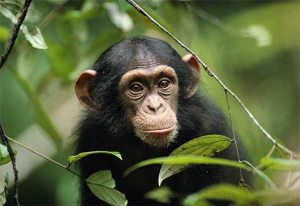Monkey Linguistics
Posted by dorian on December 12, 2009
Monkey alarm calls provide clues to origins of human language
Monkeys form very primitive sentences, scientists have discovered, in research that brings us closer to understanding the origins of language.
By Richard Alleyne, Science Correspondent

Photo: National Geographic Animal Gallery
Published: 2:15PM GMT 11 Dec 2009
A team found the Campbell’s monkey can add a simple sound to its alarm calls to create new ones and then combine them to convey even more information.
Human language is incredibly complex, but one defining feature is the process of adding a prefix or suffix to a word to change its meaning.
For example, adding “hood” to the word “brother” to form “brotherhood”.
Researchers looking at Campbell’s monkeys (Cercopithecus campbelli campbelli) in the Ivory Coast’s Tai National Park found that these primates do a similar thing.
The researchers studied alpha males in six wild groups.
These monkeys do not play a very social role but are alert to potential threats and disturbances and use their calls to highlight them.
The researchers discovered that the monkeys made several distinct alarm cries, among them calls described as “boom”, “krak” and “hok”.
The team found that booms were sounded when a falling branch had been spotted or to initiate group travel.
Kraks were only given after a leopard had been sighted while hoks were almost exclusively sounded when a crowned eagle swooped above the canopy.
But further analysis revealed that while booms were always unaltered, the monkeys sometimes added an “oo” to their kraks and hoks – and this transformed the information they were conveying.
Klaus Zuberbuehler, an author of the paper from the University of St Andrews, Scotland, said: “If you add this subtle additional oo unit to turn krak into krak-oo, then that call can be given to a whole range of other contexts.
“If you take the suffix away then it is almost exclusively a leopard alarm call.”
While krak-oo appeared to be a general alarm call given to almost any disturbance, hok-oo was used for commotion specifically in the canopy, from the presence of neighbouring groups of monkeys to a glimpse of other flying animals.
source: Telegraph.co.uk
dorian said
i was looking to post something along the lines of pond scum but found this interesting bit about monkeys. monkeys and linguistics together – how could i resist?
LikeLike
Enkill_Eridos said
Everyone likes monkeys. How could you not they look all cute…
LikeLike
1minionsopinion said
It says a lot about the education system if they have to give an example of a suffix, without even bothering to say it’s a suffix. I’m “pre”disposed to be snarky this morning, I think.
Interesting article though. I’m not surprised by it. All animals have a language of sorts, be it by scent information, growls or ear tweaks. Mistake the signs at your peril…
LikeLike
dorian said
now e_e, you have enough mouths to feed in your zoo!
this monkey has such a cute expression. looks like some other naughty monkeys took his candy away or something…
LikeLike
dorian said
snarky minion this morning, what have you been doing these days?
i like chinese mandarin oranges too!
LikeLike
Anonymous said
if you are out yelling “krak” in my neighborhood,
it takes on a whole nother meaning.
LikeLike
Enkill_Eridos said
That reminds me of something a racist christian told me once…we were talking about evolution, and he said he believed in it. Just does not believe the europeans evolved from monkeys but they were created. I will just leave it at that because the end of that conversation was I said he was a racist asshole and walked away.
LikeLike